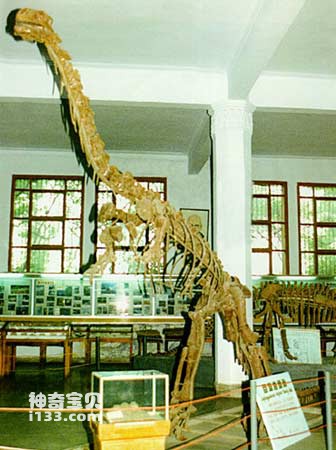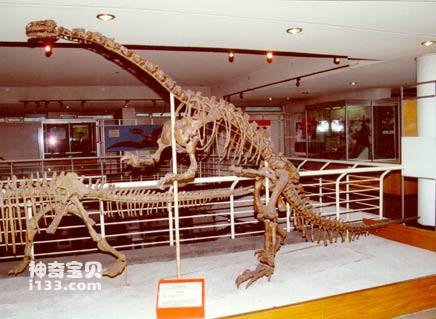Lufengosaurus is one of the earliest paleopod dinosaurs discovered in my country. It belongs to the paleopod suborder Plateosauridae. It is light in body, with a small and not too elongated skull, round eye sockets, a strong tail, and the first fingers (or toes) of its hands and feet are particularly developed; it has at least 25 teeth up and down in its mouth, and these teeth are shaped like leaves. Similar, the front and rear edges are slightly serrated. The forelimbs of Lufengosaurus were not very short, unlike typical bipedal dinosaurs, and it may have had limited ability to walk on four legs. Lufengosaurus lived on the shores of lakes or swamps and was probably an omnivorous dinosaur.

Giant Lufengsaurus
Lufengosaurus was discovered in Lufeng County, Yunnan Province, my country. Now there are two types of Lufengosaurus Xu and giant Lufengosaurus.
Xu's Lufenglong is about 6 meters long from head to tail and stands over 2 meters tall. Its head is small, its mouth is pointed, its nostrils are in the shape of an equilateral triangle, and its eye sockets are quite large. The denticles on which the teeth grow are thin and weak. There are about 27 upper teeth and 20 lower teeth. They are in the shape of flat leaves and have serrations on the front and rear edges. Xu's Lufengosaurus had a long neck with 10 cervical vertebrae (vertebral bones in the neck). It has 14 dorsal vertebrae (the vertebrae in the back), 3 sacral vertebrae (the vertebrae in the lower back), and 45 caudal vertebrae (the vertebrae in the tail). Its cervical and dorsal vertebrae are quite strong. The forelimbs of Lufengosaurus Xu's were short, and the hind limbs were long and thick. Both the front and rear feet had five fingers (toes), and the phalanges of the hind feet were stronger than those of the front feet. The first claws of the front and rear feet were both well-developed. It is speculated that when it was alive, it could stand and walk on its hind legs, with its tail dragging on the ground for balance. It can also land on its forelimbs when foraging or resting.
The skeletal structure of the giant Lufengosaurus is very similar to that of Lufengosaurus Xu, except that it is obviously larger and bulkier than Lufengosaurus Xu.

Xu's Lufenglong
animal tags:
We created this article in conjunction with AI technology, then made sure it was fact-checked and edited by a Animals Top editor.